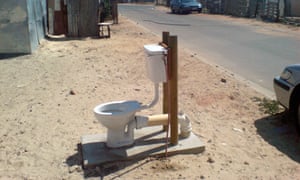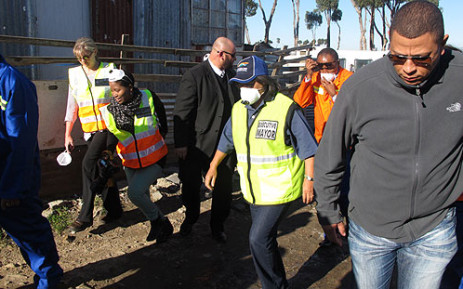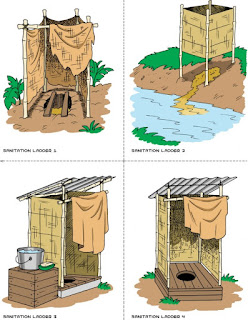When sanitation becomes political - Cape Town the 'Poolitical' City
Take some time to analyse this picture:
It took me a bit of time to fully digest what is happening in this picture, thinking about what conclusions could be drawn from it based on all that we know so far about sanitation, but also the wider geographical and historical conclusions that we could make- it is a fascinating picture.
This is the reality of bucket toilets - a service provided by governments to remove human waste in order to improve the sanitation of an area in the township of Ezenzeleni, Cape Town.
This is the reality of bucket toilets - a service provided by governments to remove human waste in order to improve the sanitation of an area in the township of Ezenzeleni, Cape Town.
Cape Town, according to C. Mcfarlane and J Silver (2017), has become the 'Poolitical City', where issues around sanitation has been forced out into the open. Where the government has been forced to confront some of the inadequacies of its provision on sanitation and people have openly discussed, and protested about sanitation. It makes for a hugely interesting place to study as a result. Driving this are the pressures that many cities around the world are currently facing, rapid urbanisation, poor and degraded facilities and a lack of capital to solve the issues. In Cape Town, however, the issue of sanitation goes further and links heavily to the apartheid and its legacy. Rose George in 'The Big Necessity' highlights Cape Town's divides by asking the question, "what is the difference between a township and a town", the answer she was given was the race of its population. This divide is further evidenced when looking at access to sanitation in South Africa. According to Africa FactCheck, 82% of South Africans have access to improved sanitation, however when looking at who doesn't have that access the divides are quite clear:
In the run up to local election in 2011 the Democratic Alliance, who run the state of the Western Cape, built a number of toilets (50) in some of the poorest townships in Cape Town. Their aim was to eradicate poo buckets, and to install a minimum level of basic sanitation across the city (1 toilet to every 5 households). In many respects this could be seen as a positive, bringing sanitation to areas that are lacking it. But when you look at the reality, and the context of Cape Town as a city with a legacy of apartheid many would question the delivery of 'sanitation' in this context.

The toilets built were 'open air' toilets as per the one above. Many in the townships perceived the building of these toilets as unacceptable, and the opposition party (ANC) claimed they were "apartheid toilets built by racist whites who don't respect blacks". As a result of this Capetown saw its first 'Poowars' protests.
This illustrates a further complication in sanitation, highlighted by to McFarlane and Silver, in that sanitation has so many stakeholders involved that various needs and solutions may be perceived in very different lights: "How did different groups understand what the problem was? What solutions did they identify and why?...we sought to ...understand how this process that seemed so powerfully politicized was differently seen".
The anger that these open air toilets caused lead to the start of the 'poowars' in Capetown. The 'Poowars' were part of a protest movement designed to bring the issue of sanitation to the forefront of the political mind: "No more should protest happen in the township, but in the CBD-it is that place that brought this legacy." and in many ways it was successful, attention was focused on this issue, Cape Town's Mayor at the time payed a visit to areas that were under-served by sanitation, and a clear focus on attempting to improve standards was put into action.
 |
| Mayor De Lille was heavily criticised for wearing a mask and bringing armed police with her to inspect toilets facilities |
 |
| ANC Claim on sanitation in South Africa |
However Africa FactCheck suggests that this politicisation has simply meant that authorities on both sides of the political spectrum are using it as a way of manipulating statistics to score political points. The ANC banner to the right has been deemed inaccurate and in Cape Town itself there are questions as to how many have actually benefited from the government's focus on sanitation.
Africa FactCheck investigated the claim that 'No one in Cape Town has to use a bucket toilet' and found the Social Justice Coalition report suggesting that:
"According to the 2011 census, 2.7% of the city’s households – or roughly 100 000 people – have no toilet whatsoever.[3] Furthermore, as of 2012 there were over 85 397 households – or 44% of all households in Cape Town’s informal settlements – which did not have access to basic sanitation facilities"
The SJC goes on to say that this would in all likelihood be a conservative estimate as it doesn't take into the condition of many of the toilets which are 'serviced' by private companies employed by the city authorities.
The wider reading suggests that authorities regard sanitation as important, and see that the politicisation of it can be a lightening rod either positively or negatively affecting them, as seen in the 'poo wars' in Cape Town. It also suggests that even in countries that are making relatively good progress on tackling issues around sanitation, the importance of a clear definition of what 'adequate' sanitation or even sanitation is varies, and that taking into account the different views of stakeholders may be the key to successful implementation of sanitation. It is so much more complicated than just providing toilets, Cape Town illustrates that sanitation links to people's past, their current situation and what they aspire to. In my next blog I am going explore the impacts of privatisation of sanitation, as touched on in this blog.
The wider reading suggests that authorities regard sanitation as important, and see that the politicisation of it can be a lightening rod either positively or negatively affecting them, as seen in the 'poo wars' in Cape Town. It also suggests that even in countries that are making relatively good progress on tackling issues around sanitation, the importance of a clear definition of what 'adequate' sanitation or even sanitation is varies, and that taking into account the different views of stakeholders may be the key to successful implementation of sanitation. It is so much more complicated than just providing toilets, Cape Town illustrates that sanitation links to people's past, their current situation and what they aspire to. In my next blog I am going explore the impacts of privatisation of sanitation, as touched on in this blog.




Comments
Post a Comment